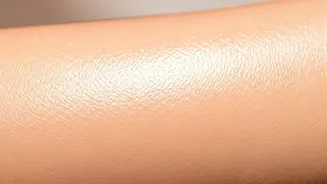Understanding Your Skin
Knowing your skin type is the foundation of any effective skincare routine. Skin types are generally categorized as normal, dry, oily, combination, and
sensitive. Each type has unique characteristics and specific needs. Normal skin is well-balanced, not too oily or dry, and typically requires minimal maintenance. Dry skin lacks moisture, often feeling tight and flaky, and requires rich moisturizers and gentle cleansers. Oily skin produces excess sebum, leading to a shiny appearance and a tendency towards breakouts. Combination skin has both oily and dry areas, usually with an oily T-zone (forehead, nose, and chin) and dry cheeks. Sensitive skin is easily irritated and prone to redness and inflammation, requiring gentle, fragrance-free products. Identifying your skin type correctly allows you to choose products that address its specific concerns, ensuring the best results. Consider visiting a dermatologist for a professional skin analysis if you're unsure of your skin type.
Building A Skincare Routine
A well-structured skincare routine typically consists of cleansing, exfoliating, treating, and moisturizing. Cleansing removes dirt, oil, and impurities, preparing your skin for subsequent steps. Choose a cleanser suited to your skin type; gel-based cleansers work well for oily skin, while cream-based cleansers are better for dry skin. Exfoliation removes dead skin cells, revealing a smoother complexion. This can be achieved chemically with AHAs or BHAs, or physically with scrubs. Exfoliate 1-3 times a week. Treating involves addressing specific skin concerns, such as acne, hyperpigmentation, or wrinkles, using serums or targeted treatments. These often contain active ingredients like retinol, vitamin C, or hyaluronic acid. Finally, moisturizing hydrates and protects the skin barrier. Moisturize daily, selecting a formula that matches your skin type; lightweight lotions suit oily skin, while thicker creams are best for dry skin. Always apply sunscreen during the day to shield your skin from sun damage. Consistency is key – stick to your routine daily for optimal results.
Essential Skincare Ingredients
Certain ingredients have proven benefits for skin health. Hyaluronic acid is a powerful humectant that draws moisture into the skin, making it look plump and hydrated. Vitamin C is an antioxidant that protects against free radical damage, brightens the complexion, and helps to reduce hyperpigmentation. Retinol, a derivative of vitamin A, promotes cell turnover, reduces wrinkles, and combats acne. Niacinamide, or vitamin B3, helps reduce inflammation, controls oil production, and minimizes the appearance of pores. Ceramides are lipids that strengthen the skin barrier, helping to retain moisture and protect against environmental stressors. Salicylic acid (BHA) exfoliates the skin and is effective at treating acne. Alpha-hydroxy acids (AHAs), such as glycolic and lactic acid, exfoliate the skin's surface, improving texture and tone. When introducing new ingredients, start slowly and perform a patch test to check for any adverse reactions. Build up the frequency of use gradually to allow your skin to adjust.
Lifestyle and Skincare
Your lifestyle choices greatly impact your skin's health and appearance. A balanced diet rich in fruits, vegetables, and healthy fats provides essential nutrients for skin health. Staying hydrated by drinking plenty of water keeps your skin moisturized and prevents dryness. Getting adequate sleep allows your skin to repair and regenerate itself overnight. Stress can exacerbate skin issues, so managing stress through relaxation techniques like yoga or meditation is crucial. Protecting your skin from sun exposure is paramount; always apply sunscreen with an SPF of 30 or higher and reapply throughout the day. Avoid smoking and excessive alcohol consumption, as these can damage the skin and accelerate aging. Regular exercise improves circulation, which can give your skin a healthy glow. By making these lifestyle changes, you'll not only enhance your skin's radiance but also improve your overall well-being.
Addressing Common Concerns
Many people experience specific skin concerns, such as acne, hyperpigmentation, and aging. Acne can be treated with over-the-counter products containing ingredients like benzoyl peroxide or salicylic acid. For more severe cases, consult a dermatologist for prescription medications. Hyperpigmentation, which includes dark spots and uneven skin tone, can be addressed with products containing vitamin C, retinoids, and niacinamide. Protecting your skin from sun exposure is also critical. Anti-aging concerns, such as fine lines and wrinkles, can be reduced with retinoids, peptides, and antioxidants. A consistent skincare routine, coupled with lifestyle adjustments, can minimize these concerns. For any persistent or severe skin issues, seek professional guidance from a dermatologist or skincare specialist. They can provide personalized advice and treatment options tailored to your specific needs.













